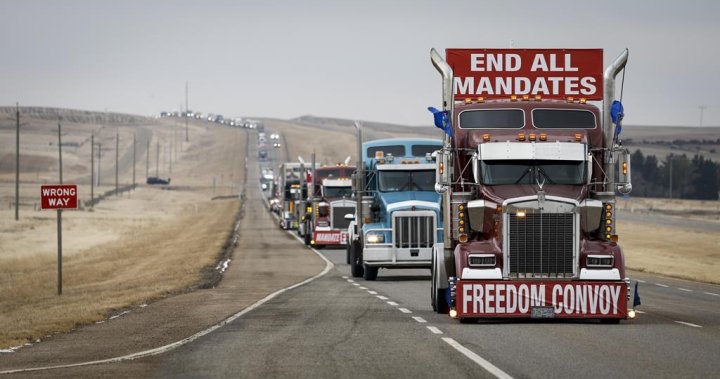During the trial of Alex Van Herk, Marco Van Huigenbos, and Gerhard Janzen, who are charged with mischief over $5,000 for their involvement in a COVID-era border blockade in Coutts, Alberta, RCMP Sgt. Greg Tulloch described the tense relationship between police and protesters. The Crown prosecutors aim to prove that the trio spearheaded the protest that disrupted cross-border traffic between Alberta and Montana for two weeks in early 2022. Efforts were made to convince the protesters to leave when Tulloch first arrived at the scene, with Van Huigenbos identified as a leader with whom most of the interactions took place. Tulloch expressed concern about the safety of allowing more individuals to join the protest, as it could lead to chaos and violence fueled by unrelated agendas.
Despite initial attempts to convince the protesters to leave, police ultimately agreed to allow logging trucks to join the blockade. However, when the highway was closed, Van Huigenbos instructed Tulloch to delay the action. Tulloch described a confrontation with a driver and the intervention of Van Huigenbos and Janzen, allowing the police to continue. The highway was completely blocked, and Van Huigenbos made it clear that he was the face of the organization and threatened to walk away if his demands were not met. He emphasized the importance of getting the trucks through quickly to maintain the trust of his followers.
Upon returning to Coutts on February 9, Tulloch observed that the situation had worsened, with the protest area now completely sealed off. He noted the presence of new individuals dressed in camouflage, giving the gathering point a military-like feel. In response to concerns about the presence of two excavators near the highway, Van Huigenbos initially failed to cooperate with police instructions to remove them, prompting police to disable the machines themselves. Van Huigenbos expressed hope that the equipment would not be damaged in the process.
The situation escalated further on February 12 when police discovered that the two large excavators had only been moved a short distance away despite instructions to remove them completely. Tulloch suspected that the excavators could be used to block the highway or dig it up, posing a significant threat to public safety. After failed attempts to reach Van Huigenbos, who had authority over the equipment, police decided to take matters into their own hands and disable the machines. Van Huigenbos later expressed concern about potential damage to the equipment during police intervention, highlighting the ongoing tension between law enforcement and the protesters.
The trial proceedings shed light on the challenges faced by police in dealing with protesters involved in the border blockade in Coutts. The testimony of Sgt. Greg Tulloch highlighted the delicate balance between maintaining public safety, upholding the law, and managing the demands of protest leaders. The escalating tensions and conflicting objectives of the protesters and law enforcement underscore the complexities of handling such situations. As the trial continues, further insights into the dynamics of the blockade and the actions of the accused individuals are expected to emerge, providing a more comprehensive understanding of the events that unfolded during the protest. The trial serves as a reminder of the importance of effective communication, strategic decision-making, and conflict resolution in managing contentious situations involving protests and public demonstrations.
Overall, the trial of Alex Van Herk, Marco Van Huigenbos, and Gerhard Janzen offers a glimpse into the intricate interactions between police and protesters during the COVID-era border blockade in Coutts, Alberta. The testimony provided by RCMP Sgt. Greg Tulloch depicts the challenges faced by law enforcement in handling the protest, navigating tensions, and ensuring public safety. The trial proceedings illuminate the complexities of managing protests and the delicate balance between upholding the law and addressing the demands of protest leaders. As the trial progresses, further details about the events leading up to and during the blockade are expected to emerge, providing a more comprehensive understanding of the situation. The trial serves as a valuable opportunity to examine the dynamics of protest movements, law enforcement responses, and the broader implications for public safety and social order.


